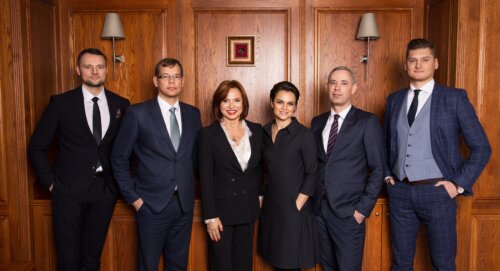Best Divorce & Separation Lawyers in Vilnius
Share your needs with us, get contacted by law firms.
Free. Takes 2 min.
Free Guide to Hiring a Family Lawyer
List of the best lawyers in Vilnius, Republic of Lithuania
About Divorce & Separation Law in Vilnius, Republic of Lithuania
Divorce & Separation in Vilnius, like the rest of the Republic of Lithuania, is governed by specific laws and regulations that aim to ensure a fair process for both parties involved. As Lithuania is a member of the European Union, its family law framework is influenced by EU regulations while also adhering to national laws. In Vilnius, divorce proceedings are handled by the district court, and the legal framework emphasizes the importance of protecting the best interests of any children involved, as well as ensuring equitable distribution of assets.
Why You May Need a Lawyer
Engaging a lawyer when dealing with Divorce & Separation is crucial for several reasons. Legal counsel can help you understand your rights and obligations under Lithuanian law, navigate complex legal procedures, and advocate on your behalf. Common situations where legal help is needed include contested divorces, division of property and assets, child custody and visitation rights, and alimony arrangements. A lawyer can also assist in mediating disputes and reaching amicable settlements that consider the interests of both parties.
Local Laws Overview
Lithuanian family law is primarily governed by the Civil Code of the Republic of Lithuania, which outlines the procedures and conditions for divorce. Key aspects relevant to Divorce & Separation include the no-fault divorce option, where a couple can divorce by mutual consent if they have been separated for more than a year. Property acquired during the marriage is generally considered joint property and is subject to division. The court prioritizes child welfare in custody disputes, and both parents are encouraged to maintain active roles in their children's lives post-divorce. Alimony may be awarded depending on individual circumstances, such as income disparity or the needs of children.
Frequently Asked Questions
What are the grounds for divorce in Lithuania?
Divorce can be filed based on mutual consent, irretrievable breakdown of the marriage, or fault-based grounds such as adultery, alcoholism, or domestic abuse.
How is property divided during a divorce?
Property acquired during the marriage is generally divided equally between the spouses unless otherwise agreed upon or ordered by the court.
What happens if we cannot agree on child custody?
If parents cannot reach an agreement, the court will make a decision based on the best interests of the child, considering factors such as child’s age, emotional ties, and each parent’s ability to cater to the child’s needs.
Can I change my last name after divorce?
Yes, after a divorce, you have the right to either retain your married name or revert to your pre-marriage surname.
How long does the divorce process usually take?
The duration varies depending on whether the divorce is contested or uncontested. Uncontested divorces may take a few months, while contested divorces can take longer, depending on the complexity of disputes.
Do I have to pay alimony?
Alimony is decided based on individual circumstances such as the income and financial needs of both parties, duration of the marriage, and child support obligations.
Can foreigners get divorced in Lithuania?
Yes, as long as one of the spouses resides in Lithuania or is a Lithuanian citizen, they may file for divorce under Lithuanian law.
What is the role of mediation in divorce?
Mediation serves as a valuable tool to amicably resolve disputes regarding divorce terms, aiming to lower the emotional and financial costs associated with contested proceedings.
Do both spouses need to attend court hearings?
In uncontested cases, court appearance might not be necessary. However, in contested cases, attendance is often required to resolve disputes.
What if my spouse doesn’t want a divorce?
If one spouse does not consent, the other can still file for a divorce citing irretrievable breakdown of the marriage, but the process may take longer and require court intervention.
Additional Resources
For additional help and resources, you can contact local Family Counselling Centers in Vilnius, the Lithuanian Bar Association for lawyer referrals, and the Ministry of Justice of the Republic of Lithuania for guidelines on legal proceedings. Non-governmental organizations such as Women's Rights NGOs may also offer support, especially in cases involving domestic issues.
Next Steps
If you require legal assistance in matters of Divorce & Separation, consider consulting with a family lawyer who specializes in Lithuanian law. Make sure to prepare all necessary documents related to marriage, assets, and any children involved. It is generally beneficial to seek an initial consultation to understand your legal standing and explore your options. Lawyers can also assist with mediation and provide representation in court if required.
Lawzana helps you find the best lawyers and law firms in Vilnius through a curated and pre-screened list of qualified legal professionals. Our platform offers rankings and detailed profiles of attorneys and law firms, allowing you to compare based on practice areas, including Divorce & Separation, experience, and client feedback.
Each profile includes a description of the firm's areas of practice, client reviews, team members and partners, year of establishment, spoken languages, office locations, contact information, social media presence, and any published articles or resources. Most firms on our platform speak English and are experienced in both local and international legal matters.
Get a quote from top-rated law firms in Vilnius, Republic of Lithuania — quickly, securely, and without unnecessary hassle.
Disclaimer:
The information provided on this page is for general informational purposes only and does not constitute legal advice. While we strive to ensure the accuracy and relevance of the content, legal information may change over time, and interpretations of the law can vary. You should always consult with a qualified legal professional for advice specific to your situation.
We disclaim all liability for actions taken or not taken based on the content of this page. If you believe any information is incorrect or outdated, please contact us, and we will review and update it where appropriate.
















